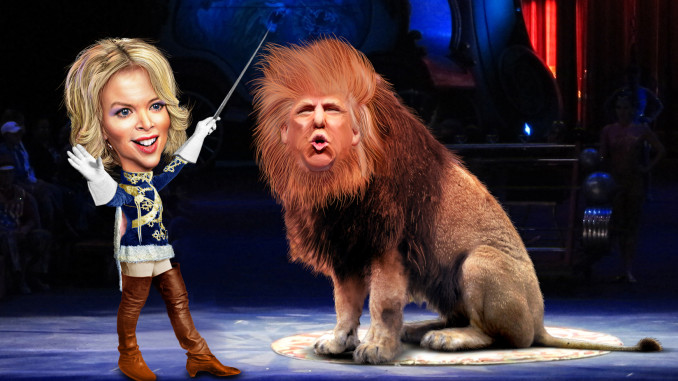
An expanded, revised version of this article is now available in the new book: The Media Versus the Apprentice: The Devil Mr. Trump.
MEDIA MEME:
In the first Republican debate, moderator Megyn Kelly listed how Donald Trump had insulted women. She showed that he was a misogynist.
WHAT REALLY HAPPENED:
Megyn Kelly made it sound as if three insults Trump said about a comedian had been repeated to multiple women. Trump said such things when he was a TV entertainer feuding with comedian Rosie O’Donnell, who had publicly ridiculed him first. She had mocked him for his physical appearance, the way he talks, and his personal life. She also used a grossly vulgar insult. Similarly, Trump insulted two news commentators, because they had ridiculed him at length for many years. Finally, Megyn Kelly portrayed one phrase Trump said in his TV show as if it had been an impropriety or sexual harassment. Yet the woman involved categorically denied what Kelly implied, and she repeatedly defended Donald Trump. Megyn Kelly didn’t give any examples of the many times when Trump praised women. She didn’t mention that Trump insulted men far more often than women. Thus she portrayed Trump as a misogynist.
Words have a power to offend, especially to someone who has endured ridicule. For people who have not, it’s difficult to imagine just how hurtful some insensitive words can be.
One person may think that it’s just friendly banter, teasing, poking fun at someone else. But that other person can feel that it’s cruel, humiliating and deeply painful. The gap between the two views is immense; it creates personal and social divisions.
The same words that entertain and amuse millions of viewers of award-winning television shows, like Two and a Half Men, and How I Met Your Mother, are also used by some children to bully others and by many rude adults.
August 2015. Fox News commentator Megyn Kelly asked Donald Trump a question in the first Republican debate:
Kelly: You’ve called women you don’t like: fat pigs, dogs, slobs, and disgusting animals…”
Trump interrupted: “Only Rosie O’Donnell.”
Many people in the audience burst out laughing; they cheered, and applauded.
Kelly replied: “No it wasn’t.”
People continued to cheer and applaud.
Trump said: “Thank you.”
Kelly: “For the record, it was well beyond Rosie O’Donnell.”
Trump admitted: “Yes, I’m sure it was.”
Kelly: “Your Twitter account has several disparaging comments about women’s looks. You once told a contestant on Celebrity Apprentice it would be a pretty picture to see her on her knees. Does that sound to you like the temperament of a man we should elect as President…?”
Trump replied that a big problem is political correctness. I think he meant people’s excessive sensitivity to certain words. The audience cheered again. He added:
“frankly, what I say— and oftentimes, it’s fun, it’s kidding, we have a good time— what I say is what I say. And honestly, Megyn, if you don’t like it, I’m sorry. I’ve been very nice to you, although I could probably maybe not be, based on the way you have treated me…”
This one exchange generated media controversies and public distress for over a year. It still does. It was so significant that I had to analyze it. This is what I found.
Megyn Kelly: “You’ve called women you don’t like fat pigs, dogs, slobs and disgusting animals.”
Looking into this, I found that Kelly actually exaggerated by saying “women you don’t like.” By saying just that, she avoided saying that Trump criticized the women in question (O’Donnell, Gail Collins, and Arianna Huffington) because they had all ridiculed him first, publicly, and extensively.
To be fair, Kelly exaggerated again by saying that Trump called women “fat pigs.” On the record, he had only called one woman a “fat pig”: comedian Rosie O’Donnell. Kelly made it sound as if he used this insult on multiple women.
Then Kelly said that Trump called women “slobs.” But again, she exaggerated. She had one example: Rosie O’Donnell. Yet Kelly made it sound as if Trump said this about multiple women.
Megyn Kelly’s fourth exaggeration was that Trump called women “disgusting animals.” But Kelly had not even one example of Trump saying exactly this. However, Trump had indeed criticized one woman as being both “disgusting” and an “animal.” Rosie O’Donnell.
Yet Kelly was right that Trump had insulted some women as “dogs.” Namely, two news commentators: Huffington and Collins. (I discuss these incidents here and here.)
Also, Kelly continued: “Your Twitter account has several disparaging comments about women’s looks.” Yes, but Kelly didn’t mention that Trump often praised many, many women.
Finally Megyn Kelly said: “You once told a contestant on Celebrity Apprentice it would be a pretty picture to see her on her knees.”
When I heard this claim I was stunned.
It sounded as if Donald Trump had sexually harassed a woman on his television show, perhaps off-camera, by demanding that she kneel before him. The rich man demanded that a woman get down on her knees, for what? A demeaning power trip? A sexual act?
But that’s not what happened.
Instead, in that episode of Celebrity Apprentice, while Trump was not even there, one of the contestants, Brande Roderick, a model, got down on her knees to humorously beg to be team leader, out of her own initiative.
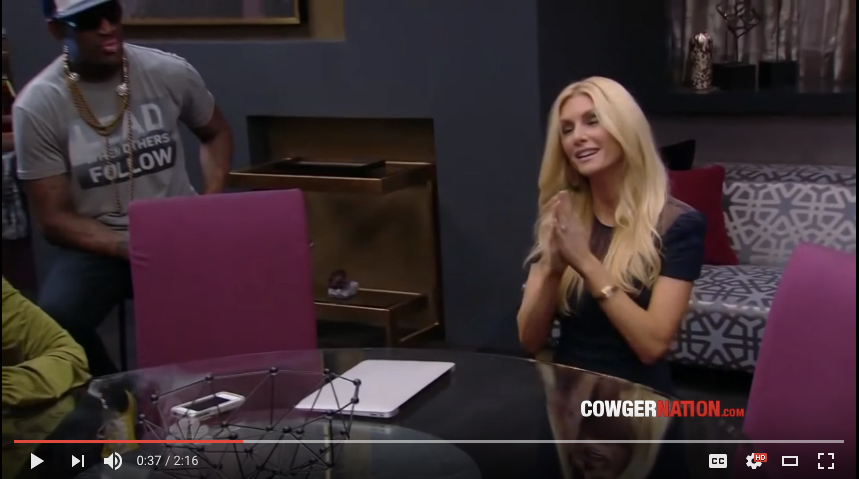
Later in the show, another contestant told Trump about the incident. Trump’s reaction was mild shock. He balked: “Excuse me! You dropped to your knees??” Apparently Trump thought it was outrageous that she would get down on her knees and beg. So this wasn’t Trump’s idea, suggestion, request, or imperative.
Brande replied “Yes,” and the other contestant reiterated that “she begged to do this.” Then Trump said: “Must be a pretty picture you dropping to your knees.” And Brande half-smiled.
By taking it out of context, Megyn Kelly made it sound like sexual harassment. In fact it was a minor comment that generated no reactions when it happened: no complaints from viewers, contestants, or from Brande Roderick herself.
To the contrary, Roderick was surprised that Megyn Kelly brought this up. Roderick said she “didn’t even remember him saying that.”
In fact, Roderick then defended Donald Trump. After watching a clip of the episode, Roderick commented:
“I’ve always had a positive experience around Donald. He’s always been encouraging. He’s never been disrespectful to me. I don’t condone men being derogatory, but I think he was just — you know, he’s on television, he’s trying to be funny. I don’t think that he meant anything horrible by it.”
A year later, Roderick again defended Trump in an interview to CNN. She explained:
“There is a difference between somebody saying something derogatory and demeaning, and what he said to me was completely innocent. And believe me, I certainly know the difference between somebody saying something derogatory or demeaning. And, I think that a lot of things are taken out of context.”
She then said that Trump was the best person to be President.
Yet the CNN interviewer insisted: “How did that make you feel?” What Trump had said on TV. Roderick insisted:
“It was completely innocent. It did not make me feel one way or the other. I know what it’s like to have a feeling of somebody being derogatory towards you, or demeaning. It feels like, uh, you’re being kicked in the gut. It feels like you want to vomit. And believe me that was the complete opposite and it was completely innocent.”
The Apprentice television shows ran for fourteen seasons. I imagine Megyn Kelly or Fox News staffers watching episodes, trying to find something offensive in the show. The worst thing they found was this minor moment: that although Roderick begged on her knees, Trump said that it “must be a pretty picture.”
But I’m not even sure. Someone tells me that “a pretty picture” is sometimes a sarcastic idiom. For example:
“All this mud on the floor, clothes everywhere, empty chip bags and pop cans; such a pretty picture!”
“It must be a pretty picture with my 91 year old mother and 87 year old aunt directing me on what to do!”
“cold-hearted people would rather these poor mothers die on the street instead. That would be a pretty picture of America, right?!”
“‘Wow, that must be a pretty picture,’ Kimberly said sarcastically.”
“if he’s sounding concerned rather than ripping my lungs out through my left ear I must be a pretty picture.”
Yet Megyn Kelly made it sound as if Trump had told Roderick to get down on her knees, for some egregious reason.
Summing up, this is what Megyn Kelly said:
“You’ve called women you don’t like fat pigs, dogs, slobs and disgusting animals. Your Twitter account has several disparaging comments about women’s looks. You once told a contestant on Celebrity Apprentice it would be a pretty picture to see her on her knees.”
Instead, if Kelly had tried to be fair, she could have said:
“When famous men or women publicly berate you, you insult them back. After comedian Rosie O’Donnell mocked you at length, you called her disgusting, slob, animal, fat pig. After two female journalists mocked you a lot, you called them dogs. Your Twitter account has disparaging comments about some women’s looks. But to be fair, usually you praise women, and you do insult men more often than women.”
This is still pretty bad, but it’s not misleading and incendiary, unlike what Megyn Kelly said.
Trump had just used common insults. He had said the kind of insults millions of people use. Both men and women use and receive them.
Thanks to Google, it’s possible to search insults online to find roughly how common they are. For example, I searched: “she’s an animal” -Rosie -Trump -O’Donnell -Donald. The “minus” terms exclude links about Trump and O’Donnell. For this search, Google gave 291,000 results. Thus I made the list below to compare: Who gets most of these insults online, men or women?
- he’s an animal 328,000
- she’s an animal 291,000
- he’s a dog 378,000
- she’s a dog 343,000
- he’s a pig 330,000
- she’s a pig 313,000
- he’s disgusting 50,800
- she’s disgusting 36,200
- he’s fat 224,000
- she’s fat 358,000
- he’s a slob 68,600
- she’s a slob 82,900
(And who wrote most of these insults? Men or women? I don’t know.) Again, all of these searches try to exclude Rosie and Donald. The results show that these insults are very common, both for women and men. Imagine how often these insults are used outside the internet. How many of the people who sometimes say such things, women and men, were offended by Trump’s insults to Rosie O’Donnell?
Have you ever said any of them? Which ones?
Megyn Kelly successfully branded Trump. Her list of examples seemed sufficient for people to start referring to him as a sexist pig—a fat, disgusting animal, a dog. He got back every insult he had hurled. Celebrities and millions of Americans insulted him.
Take just a few examples. Actress Julia Stiles said that Trump was “disgusting.” Robert DeNiro said that Trump was “blatantly stupid, he’s a punk, he’s a dog, he’s a pig, he’s a con, a bullshit artist, a mutt…” Residents of buildings bearing Trump’s name signed petitions to have the name removed, saying: “He’s disgusting.”
People love to insult their political enemies. But it seemed that Trump should never insult celebrities who publicly insulted him first. No this for that. It would be unseemly for a politician to bicker.
In any case, Trump’s #1 target was comedian Rosie O’Donnell. Why did he ever insult her?
Rosie O’Donnell began the feud when she publicly ridiculed Trump in an episode of ABC’s The View, back in 2006.
What happened was that Tara Conner, the 20-year-old winner of the Miss USA pageant, was at risk of losing her crown for having used drugs. Trump was the owner of the Miss USA contest. So he held a press conference to announce that Tara Conner would continue as Miss USA. Trump said:
“I’ve always been a believer in second chances. Tara is a good person. Tara has tried hard. Tara is going to be given a second chance.”
The next day, Rosie O’Donnell ridiculed Trump on ABC’s morning show The View. The news media often lists Trump’s insults to O’Donnell, but they rarely quote how she ridiculed him first. So, here’s a list of her criticisms, that day in 2006:
- Rosie disparaged the Miss USA pageant, and said that the contestants “like to go to [the nightclub] Studio 54 and do some crack” cocaine.
- Rosie ridiculed Tara Conner for thanking Trump for giving her a second chance.
- Rosie ridiculed Trump’s hair, flopping her hair over her head.
- Rosie mocked how Trump talks, and his facial expressions.
- Rosie said “he annoys me on a multitude of levels.”
- Rosie complained that he “left the first wife, had an affair.”
- Rosie complained that he “left the second wife, had an affair.”
- Rosie sarcastically said that Trump “had kids both times, but he’s the moral compass for 20-year-olds in America.”
- Rosie said: “Donald, sit and spin.” According to the Urban Dictionary, sit and spin is a way “to tell someone ‘Go Fuck Yourself.’ It’s the kind of phrase that even if you’ve never heard it before, when said at the right time with the right attitude, everyone in the room knows exactly what it means.”
- Rosie said: “I don’t enjoy him, no. No, no, no.”
- Rosie said that Trump’s father gave him all his money.
- Rosie continued: “and he’s been bankrupt so many times!”
- Rosie added “people beneath him got shorted out of the money.”
- Rosie said that “this is not a self-made man.”
- Rosie added: “He didn’t pay off the people he owed.”
- Rosie predicted that: “He’s gonna sue me but he’ll be bankrupt by that time.”
- Rosie said that Trump is “one of those snake-oil salesmen…”
- Rosie repeated: “I don’t enjoy him.”
- Rosie again disparaged the Miss USA pageant.
- Rosie alleged that Trump used Tara Conner’s problem for self-promotion.
While Rosie said all these things, her co-hosts and the audience laughed. I confess that I too laughed, I thought it was funny.
Trump felt annoyed and offended. So he spoke to People Magazine, and hurled these criticisms at O’Donnell:
- She’s “a woman out of control.”
- “Rosie’s a loser. A real loser.”
- “I’ll most likely sue her for making those false statements.”
- “I look forward to taking lots of money from my nice fat little Rosie.”
- “I think she’s just terrible.”
Trump also admitted that maybe O’Donnell’s attacks were personal because one time previously he had sarcastically chastised her about her “failed magazine” and her “failed talk show.”
Thus began the fight between comedian Rosie O’Donnell and Donald Trump. It has lasted for years, so I won’t list all their insults. However, Trump ridiculed her more than he had ever insulted anyone publicly before.
Many people think that a man should never, never insult a woman, no matter what. They think that it’s fine to insult and ridicule men, but never women. Yet Trump was an equal-opportunity insulter, he insulted both, particularly if someone has insulted him at length.
Still, regarding the accusation of sexism, we might note that Trump occasionally used some of the same insults on men.
In his 1987 book, The Art of the Deal, Trump disparaged a good but not very trustworthy employee: “a short, fat, bald-headed guy with thick glasses and hands like Jell-O.” In 1993, after being criticized by Connecticut Governor Lowell Weicker, Trump called him “a fat slob.” In 2014, Trump ridiculed a man as a “dishonest slob of a reporter, who doesn’t understand my sarcasm.” In August 2015, Trump mocked pollster Frank Luntz as “a low class slob.” In April 2016, Trump ridiculed Ohio governor John Kasich for the “disgusting” way he ate: “eats like a slob.” On August 3, 2015, Trump criticized Edward Snowden: “he’s disgusting.” In a book of 2007, he referred to a banker as “an animal.” In 20XX, he called Mac Miller an “ungrateful dog!” In an book of 2004, he criticized a sports writer: “Don’t be a pig.” Trump often says that some men are losers, for example, in a book of 2010 he recalled what he said to a friend: “told him that he was a big time loser.” Etc.
However, note that with Trump some of the same words that he used as insults, he also used sometimes as compliments. Being an “an absolute animal” can mean that you’re a great businessman.
Trump’s rude war of words with O’Donnell cost him greatly. His allegedly “kidding” remarks as a television entertainer were used against him in the Presidential race, to help millions of people hate him.
By not mentioning his praise for women, or his insults for men, Megyn Kelly successfully converted Trump’s Rosie insults into misogynist insults for women in general.
An expanded, revised version of this article is now available in the new book: The Media Versus the Apprentice: The Devil Mr. Trump.
Alberto A. Martinez is a professor of History at the University of Texas at Austin.
Next: Attack dogs at the Huffington Post?

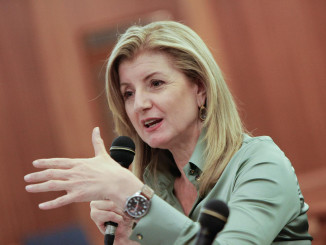
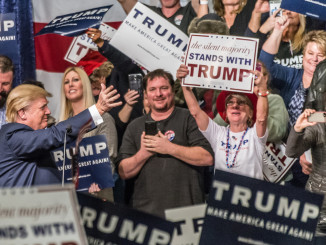
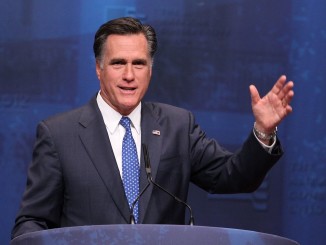
right after the election she complained that Trump’s lawyyer said “let’s gut her” or that he re-tweeted it, and that it meant that they wanted the mob to rip her guts out or something like that. Again, taking the words in the worst imaginable most literal way. Then Trumps lawyer said that the main definition of “gut” is to make something less effective, that only the second definition is to eviscerate an animal. Megyn also said that Trump was vindictive and poisoned her like before the big first debate. if she’s a real journalist she should be familiar with common expressions, such as gutting someone doesn’t mean killing them. but victimhood is a rewarding art that generates traffic and likes.